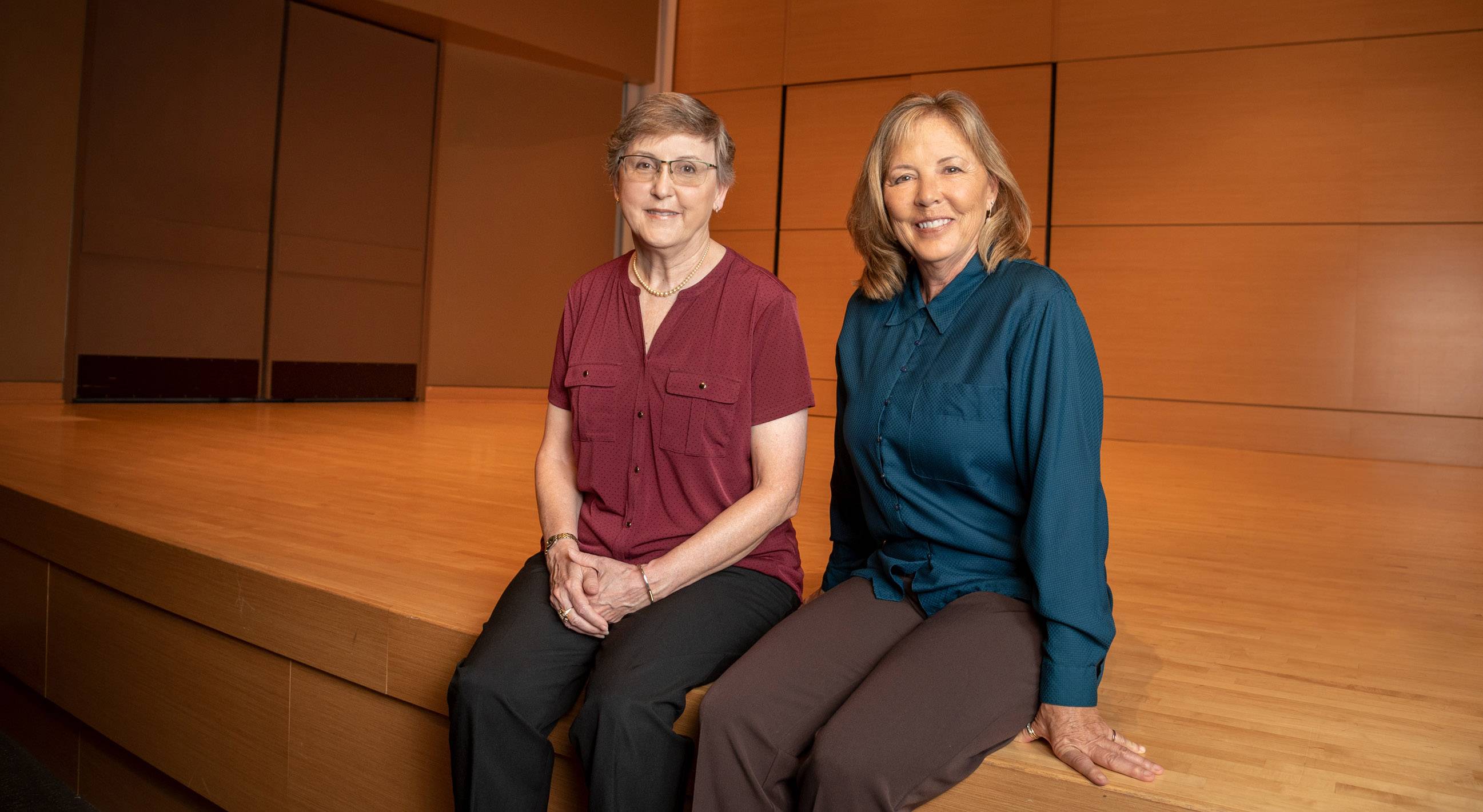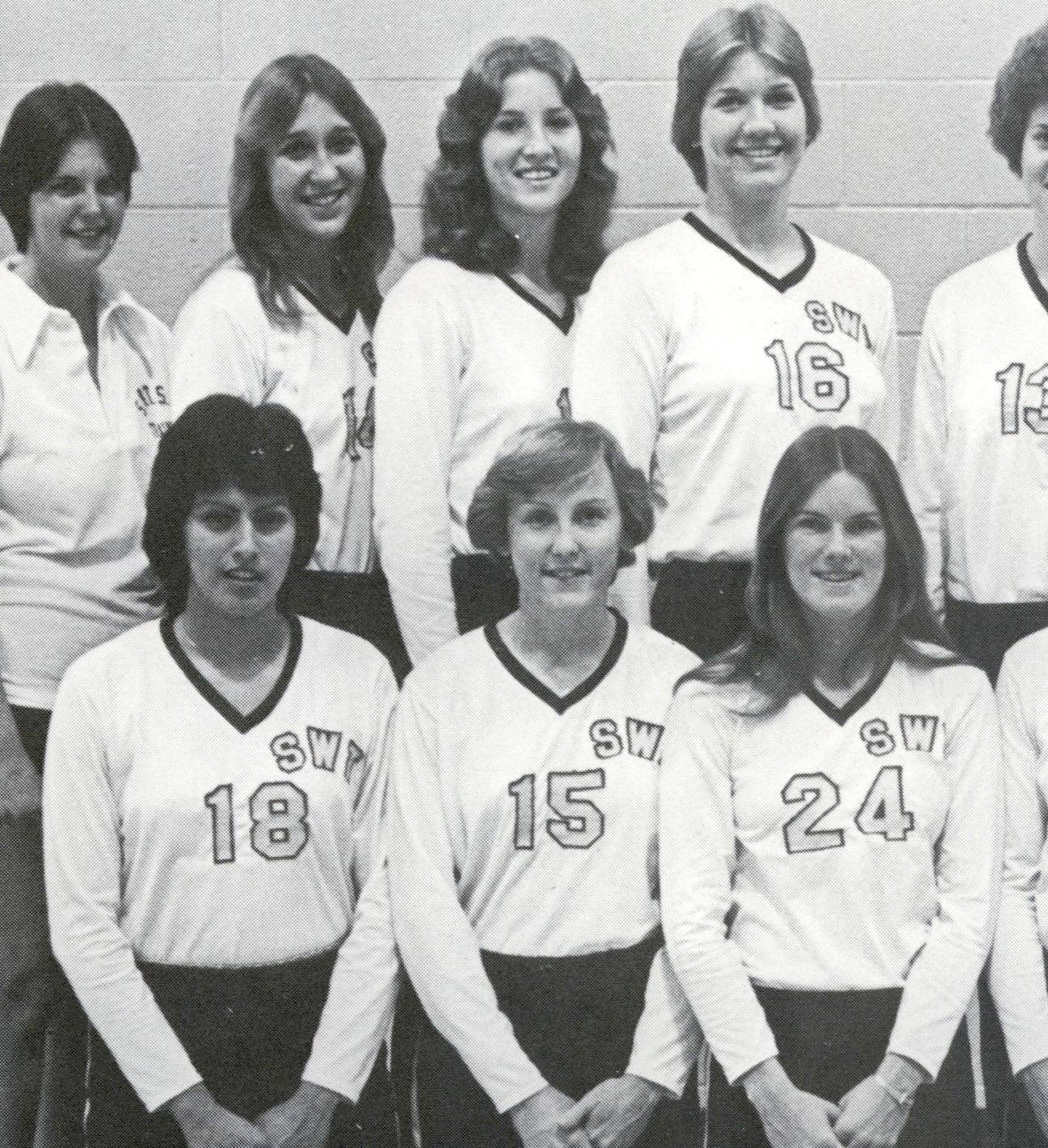
FitzPatrick sisters honor family who taught and studied at Texas State
By Julie Cooper
Shannon FitzPatrick says that the faculty of Texas State University helped raise her and her sister, Kathleen “Kate” FitzPatrick. Growing up, the sisters shared their home with their mother, Merry Kone FitzPatrick (B.A. ’42, M.A. ’47), a professor who taught history for 30-plus years.
“Our house was always full of faculty members. My mother was one of those people — the women back then who entertained. You welcomed the new faculty over to your house with dinner parties,” Shannon says.
Being the children of a respected professor also meant the sisters were sometimes under the watchful eye of other faculty members in town or on campus. They lost their father, McCall FitzPatrick, when they were very young.
Merry Kone FitzPatrick earned her degrees in art and history and would serve on the university faculty until her retirement in 1993. She was one of the first professors drafted in 1967 to teach courses in what would become the Honors College. She taught English, along with European, American, and ancient history. She also supervised generations of student teachers. There are two scholarships in her name, the Merry Kone FitzPatrick Endowed Scholarship in Honors and the FitzPatrick — Clayton — Kissler Endowed Scholarship in History.
This spring, the FitzPatrick family was the first to donate $1 million to fund the construction of the new School of Music building as part of the NEXT IS NOW Capital Campaign. It is their way of memorializing their Bobcat family.
Music and the creative arts have played a big part for the FitzPatricks. Their uncle, Lewis Woods Kone, earned a degree in biology from Texas State in 1947 after serving in World War II. His first love was music and he graduated from the Cincinnati Conservatory with a master’s degree before teaching at Sam Houston University. He was studying at UT-Austin and writing an opera when he died at age 43. Two scholarships, the Woods Kone Endowed Music Scholarship and the Lewis Woods Kone Jr. Choral Scholarship, honor him. “Mother was so very, very proud of her younger brother. When he died and she started this scholarship, we were struggling financially but she did it anyway. I’m not sure why she didn’t do that at Sam Houston State,” Kate says.
“Scholarships are a way of keeping a person alive. When you care about somebody, when you put a scholarship in their name, it is going to continue their memory long after they are gone — long after you are gone. I love that,” Shannon says. “I want people to remember my uncle’s name. He was a brilliant pianist. He used to hang out with Van Cliburn.”
Kate FitzPatrick remembers feeling like she shared her mom with students. She was in high school when a young man in one of her mother’s history classes asked if he should get a job in his chosen major of agriculture or pursue a career in the music he loved. The professor encouraged the 20-something George Strait to pursue his music passion. Then she asked Kate, who often heard Strait perform at the Prairie Rose in San Marcos, “Is he any good?”
Over lunch in downtown San Marcos, Shannon talks about her ancestors who emigrated from Georgia to Texas before the Civil War, about growing up as the sixth generation in San Marcos, and about later working at Texas State. She served for two decades as director of the Attorney for Students office. Her husband, Ron Bowden, worked in Support Systems for the university until his retirement. They have a son, Lewis, who graduated in 2022 with a bachelor’s degree in criminal justice. Shannon and Ron are members of Forever Bobcats, although neither graduated from Texas State.

Shannon played volleyball for the Bobcats for two years before transferring to Southern Illinois University. “A friend of mine from high school encouraged me to try out for the volleyball team because she didn’t want to do it on her own,” Shannon says. “I’d been recruited by a few schools but didn’t think much about it. I got on the team, she didn’t. It was very awkward. I ended up enjoying it more than I thought I would.”
Illinois came calling with a scholarship and she accepted. She earned a bachelor’s in education and later a master’s degree at the University of Wyoming. Shannon taught physical education in Houston for five years before pursuing a law degree at the South Texas College of Law.
Kate began her studies at Texas State and took summer classes too, but she earned degrees in landscape architecture and community and regional planning at Texas A&M University and the University of Texas at Austin. Calling herself “the black sheep of the family” for studying at A&M, Kate recalls her mother insisting she take political science at Texas State.
Recently retired from the Texas Commission on Environmental Quality, Kate still does landscaping for clients and volunteers at several animal nonprofits in the Austin area. As for why she supports music and the arts, it is simple: “It is important to be well rounded. You can do whatever occupation you do and have your money, but you need the arts,” she says.
In the late 1990s, shortly after Shannon started working at the university, the movement to change Southwest Texas to Texas State was beginning to take shape. Shannon, along with then-Dean of Students John Garrison, helped create a whitepaper on how the name change could be accomplished. She also participated in a Pride and Traditions task force and co-chaired the Common Experience Committee in 2017–2018.
Since retiring from Texas State, Shannon works with various nonprofits such as Mano Amiga, helping immigrants in Central Texas, and does pro bono work for women on Texas’ death row.
“I see brilliant young people coming out of this university in the music program,” Shannon says. “It is a hard major and we need to give them the tools to have the greatest amount of success. Some of that obviously comes from scholarship money, but it also comes from the facilities that help students reach their potential.” ★
University Archives preserve oral histories of Texas State
Merry Kone FitzPatrick’s memories of San Marcos and Texas State in the 1930s are preserved as an oral history in the University Archives. From her childhood in the 1930s to becoming a college student in the 1940s, and finally as a faculty member throughout the 1980s, these stories are a fascinating time capsule of Texas history. Listen or read the transcript to learn some interesting first hand accounts from decades past.
Becoming a faculty member:
I finished (getting a master’s degree) in the summer of ’47, and Dr. Taylor wanted me to teach here because it was really — we had all these veterans coming back, and he was having a dickens of a time getting teachers, and I told him I didn’t want to teach here. He badgered me all summer. He would say, “I’ll give you one more chance, say yes or no.” I’d say, “No.” And he just kept on and on and he offered me $2,400. He said — he must have asked me 10 times — and he’d say, “Yes or no,” and I’d say, “No.” And he’d wait a while longer. I didn’t want to stay because I knew how stupid I was and how little I knew. He then raised the offer $200 to $2,600. He said, “Do you realize this is for nine months, not 12 months?”
Actually, I hadn’t known that, so I decided to try it, and that first year of teaching was the most miserable year of my life because everybody in the room was older than I was, or so it seemed. I was teaching world history, and I felt so ignorant. And I was. I was moaning one day — we had a man who was head of the education department a long time, and he was such a nice man, Dr. Lloyd Rogers. And I was telling him how awful I felt. He said, “Never underestimate the ignorance of a freshman!” And you know that helped from then on out. I might not know much, but they knew less than I did. So, I tell my young teachers that sometimes, even though you don’t know much, you know more than they do. (Laughs) That’s what I tell them.”